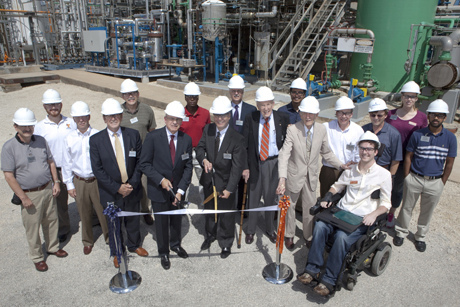The world-renowned facility, which is operated by UT’s Separations Research Program (SRP), recently received building renovations and new computers, instruments and other hardware to help increase capacity at the pilot plant, where engineering students and researchers work side by side to study manufacturing processes for a range of industries including oil and gas and food.
 Frank Seibert, technical manager of SRP, said the pilot plant has received donations in the past but none at the level of Emerson’s $300,000 donation.
Frank Seibert, technical manager of SRP, said the pilot plant has received donations in the past but none at the level of Emerson’s $300,000 donation.
“There is no other pilot plant like this in the world,” Seibert said. “By upgrading our pilot plant using the latest Emerson automation technologies, we are able to build on our reputation and deliver solid research results to our customers,” Seibert said.
Seibert said Emerson and the university have worked together over the past 10 years, during which time the facility purchased discounted equipment and hardware from Emerson. It wasn’t until a customer tour of the pilot plant last year, however, that a senior vice president from Emerson saw that some of the equipment being used could be updated and decided that the company should help the plant by making a donation, Seibert said.
The unique partnership between UT and Emerson underscores one the goals of SRP and the Cockrell School: to link public and private sectors together and to fuse research and development to improve the nation’s technology base.
“With limited federal and state dollars for advancing the research at universities, public and private partnerships, like what the University of Texas has with Emerson, are increasingly important. With strong engagement between the university and industry, we can foster the transformative research that will improve our society,” said Gregory L. Fenves, dean of the Cockrell School of Engineering.
The renovations will enable the SRP pilot plant to improve its operations through more reliable control, more accurate measurement and a better understanding of process and equipment data, Seibert said.
More about the SRP plant:
The plant operates roughly 200 days per year on studies that usually take two to three months. During each study, the plant is modified to meet the unique needs of commercial clients, which range from oil, chemical and food companies seeking to improve operations in their production facilities and prove returns on investment before scaling up to production.
The plant has also developed an innovative CO2 separation process that reduces CO2 emissions and associated energy requirements for coal-fired operations as well as reduces the typical process-equipment footprint by two-thirds. The process uses the latest Emerson technology and will undergo field trials later this year. In 2011, the plant plans to double the scale of the technology for another commercial installation.







